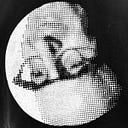license to carry.
I paused before the closing lines, not for dramatic effect, simply to collect my thoughts. The I began to read, holding onto the top of the solid wood podium, my voice very dry.
“Jake had jumped jail and he knew that this time
he wasn’t going to take prisoners.
He kept his hands firm on the wheel and said, ‘I have a BOLO out on me.’
Dan said, ‘How’s that any of my business?’ and added, ‘I want a line.’
Jake said, ‘I’d flipped burgers most of my life
but now have a license to own and carry.’
They reached a fork in the road, Jake hit the brakes,
bringing the Impala to an almost complete stop.
After a beat, he said,
‘With liberty and justice for all,’
and took the road west.”
Once I was done reading, I added nothing more. No thank-yous, no closing remarks. I slowly folded my notes and stepped off the podium. An applause erupted as I walked over to the upholstered chair in the middle of the stage next to the small coffee table where the moderator had been waiting. He was the head of the faculty hosting the event, himself a fairly recognised poet. He thanked me for the lecture and went on to speak, at length, about the poet of the evening, extolling his niche role in mid-twentieth century western literature and his influence on other disciplines of art, notably on Cuban contemporary dance.
The first question from the audience was from a student — I assumed she was one — who failed to introduce herself.
“Throughout your lecture you never talked about the personal relationship you had with the poet,” she said, “You kept referring to him as ‘the poet’ or you used his last name. You never mentioned he was your father. Why, I wonder?”
Giving an answer would have been easy, not responding was a major effort. There were twenty-nine seats in the first two rows in the hall — I couldn’t see further up because the stage lights were blinding me — each seat occupied. I made eye contact with all twenty-nine people before I said “Next question, please.”
